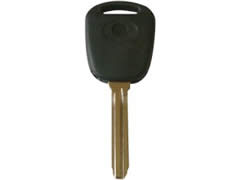Spare Immobilizer Keys: Necessary Or Not? - Vol.174
An immobilizer key is the latest innovation in anti-theft devices installed into a car or motorcycle. A chip within the plastic casing on the head of the ignition key sends a signal to the computer that runs the car, verifying that this is, indeed, the proper key to start the car. Since the only person who should have an immobilizer key is the owner or permitted driver, the computer then allows the car to become unlocked and the normal ignition pathway is followed. The immobilizer key can also be tied in with the door locking and the mechanism that locks the steering wheel. With the immobilizer in hand, all of these systems should be unlocked and therefore allow the car to start and to operate normally.

So, is a spare immobilizer key necessary? If more than one person has permission to drive the car, it can be a matter of convenience for each driver to have their own immobilizer key. The dealership should provide additional keys when selling the car; typically, between four to eight keys can be authorized to work on one specific immobilizer. If, after a vehicle is purchased, the owner finds that they need additional keys, the dealership will provide spare keys for the owner, usually at a cost.
In theory, the battery within the immobilizer key will recharge itself while the driver has the key engaged in the ignition. However, even rechargeable batteries can have a limited lifespan. While the immobilizer chip within the key draws only a tiny amount of energy from the battery, it can drain the battery down over an extended lifetime, especially if only one immobilizer key is used. There is also the worry that the recharging mechanism could be faulty and the battery will drain down naturally; this type of problem should be covered under the warranty of the car and a replacement key can easily be obtained from the dealer or the manufacturer.
Even if the immobilizer key breaks, it can still be used. The chip housed within the plastic casing does not need to be on the end of the ignition key in order to function properly; it is merely installed there as a matter of convenience for the driver. Any key shop can grind a new ignition key for the driver. So long as the driver also has the broken piece of the immobilizer with them as they start the car, the chip within the key fob will function normally. However, in order for this to work, no damage should have been incurred by the chip embedded in the immobilizer key.
In this extreme case, it is important to keep the plastic housing with the chip embedded in it near the ignition when turning the car on. Surrounding the ignition of the car featuring an immobilizer anti-theft device should be a red ring. This is the part of the car's ignition that communicates with the computer in the car, reassuring the program that this is an authorized user of the car and that it should unlock the systems normally. Keeping the key fob near this ring during ignition will allow a replacement key to operate as the original immobilizer would.
The main reason for getting and keeping a spare immobilizer key would be in the case of accidental loss of the keys. As mentioned above, the dealership or the manufacturer of the automobile can replace lost immobilizer keys, though the replacements can sometimes be expensive. There are alternatives on the market for programming an immobilizer key that is not made by the car's manufacturer. For obvious reasons, these keys are not typically endorsed by the automobile dealers and makers, and the owner of the car now assumes any risk incurred by a faulty or misprogrammed key.